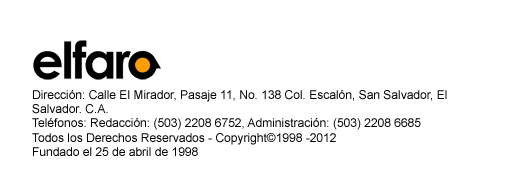YOUR VISIT TO EL SALVADOR
Publicado el 14 de Junio de 2011
id: 181186
date: 12/3/2008 14:45
refid: 08SANSALVADOR1331
origin: Embassy San Salvador
classification: CONFIDENTIAL
destination:
header:
VZCZCXYZ0008
PP RUEHWEB
DE RUEHSN #1331/01 3381445
ZNY CCCCC ZZH
P 031445Z DEC 08
FM AMEMBASSY SAN SALVADOR
TO RHMCSUU/FBI WASHINGTON DC PRIORITY
INFO RUEHC/SECSTATE WASHDC PRIORITY 0396
----------------- header ends ----------------
C O N F I D E N T I A L SAN SALVADOR 001331
SIPDIS
FOR THE DIRECTOR FROM THE AMBASSADOR
E.O. 12958: DECL: 11/26/2018
TAGS: PGOV, PREL, KJUS, ES
SUBJECT: YOUR VISIT TO EL SALVADOR
Classified By: The Ambassador, for reasons 1.4 (b) and (d)
1. (SBU) I'm delighted that you'll be visiting El Salvador.
Your presence here will reinforce the importance the U.S.
places on maintaining a close, cooperative bilateral
relationship with El Salvador. Your visit will also offer a
boost to our efforts to address the nation's most pressing
problem: a public security crisis that has spiraled out of
control. The Salvadorans will likely press you for concrete
signs of U.S. appreciation for their efforts to combat
transnational crime. We should support Salvadoran requests
or suggestions that reinforce our shared goals in the areas
of counter-narcotics, alien smuggling, and public security.
At the same time, you should urge the Salvadorans to move
forward on important public security issues such as passage
of civil asset forfeiture and wiretap legislation, as well as
progress on extradition issues.
------------------
Political Overview
------------------
2. (C) El Salvador's current political landscape is largely
the result of the 1992 Peace Accords that ended the nation's
twelve-year civil war. Under the agreement, the communist
guerillas, the Farabundo Marti National Liberation Front
(FMLN), laid down their weapons and became a legitimate
political party. The government (GOES) in return agreed to
disband elements of the military and security services
notorious for human rights violations, to allow the FMLN to
participate in the political process, to reform the
judiciary, and to form a new National Civilian Police force
(PNC) drawn from the ranks of demobilized guerillas and
former members of the armed forces. In the ensuing years,
the conservative, pro-U.S. National Republican Alliance Party
(ARENA) has won every Presidential election.
3. (C) President Elias Antonio "Tony" Saca of the governing
ARENA party assumed office June 1, 2004 after winning a
hard-fought presidential race with 57.7 percent of votes
cast. ARENA holds 34 of 84 seats in the Legislative
Assembly, but aligns with smaller parties to form a working
majority on important issues. The leftist FMLN holds 32
seats.
4. (C) Legislative and municipal elections will be held
January 18, 2009 and presidential elections on March 15, with
a runoff, if needed, in April. According to local polls, FMLN
Presidential candidate Mauricio Funes holds a slight lead
over ARENA candidate Rodrigo Avila. (Note: Avila twice
served as director of the Salvadoran National Civilian
Police, and was Deputy Minister of Public Security and
Justice. He is respected and well-known in U.S. law
enforcement circles. End note). Funes, a former journalist
who hosted one of El Salvador's most popular television news
programs, is the first FMLN Presidential candidate who is not
a former guerilla leader. Funes' candidacy, fueled by name
recognition and voter discontent over rising food and fuel
prices and the perceived lack of shared economic benefits
under ARENA stewardship, offers the FMLN its strongest
opportunity yet to win the Salvadoran presidency.
5. (C) It is not clear what an FMLN victory would mean for
the bilateral relationship. Funes and company have indicated
publicly that they will continue to cooperate with the U.S.
on counter-narcotics and transnational crime, and to support
ongoing public security endeavors such as the International
Law Enforcement Academy (ILEA) and the Comalapa Cooperative
Security Location (CSL). In contrast, the FMLN has strong
links to Hugo Chavez and rest of the Bolivarian bloc, and
Funes has promised to immediately withdraw Salvadoran forces
from Iraq should he win the election.
-----------------
Economic Overview
-----------------
6. (C) After growing by over 4 percent each of the last two
years, the Salvadoran economy now appears to be slowing and
may head into recession in early 2009, depending on the
extent of contagion from the United States. El Salvador was
the first Central American country to implement CAFTA-DR, and
exports, which have continued to increase through September
2008, remain the bright spot of the economy. Increasingly
populist policies in the run-up to 2009 elections, including
costly subsidies for electricity, propane gas, and
transportation, have led to increasing fiscal problems, and
the government has recently experienced problems in placing
its short-term debt. A number of international businesses
have recently scaled back or shut down operations in El
Salvador because of worldwide economic conditions. The
security situation continues to impose a considerable
operational cost on businesses and remains a detriment to
foreign direct investment.
---------------------------
Civilian-Military Relations
---------------------------
7. (C) The Salvadoran Armed Forces (ESAF) are capable,
professional, and subordinate to civilian authority. The
military consistently receives high approval ratings in
public opinion polls, due largely to its response to national
emergencies, including earthquakes, hurricanes, and outbreaks
of infectious diseases such as Dengue. Salvadoran soldiers
also support police in counter-narcotics efforts, anti-gang
patrols, rural patrols, customs inspections, and
reform-school training for juvenile convicts. El Salvador
has had troops on the ground in Iraq in support of Operation
Iraqi Freedom (OIF) since 2003. The Salvadoran contingent,
which has concentrated on humanitarian reconstruction
efforts, has suffered five fatalities since 2003. El
Salvador was one of five countries invited by the GOI to stay
on after the UN mandate expires December 31.
-------------------
Immigration and TPS
-------------------
8. (C) Some twenty-five percent of Salvadorans live in the
United States, many illegally. Since the 2001 earthquakes,
between 250,000 and 280,000 Salvadorans have benefited from
Temporary Protected Status (TPS) and have been able to live
and work legally in the United States. Remittances from
Salvadorans living abroad provide an important source of
income for their families in El Salvador. In 2006,
remittances amounted to $3.3 billion, approximately 18
percent of GDP. Public opinion polls also show that 7 out of
10 Salvadorans would emigrate to the United States if given
the chance. The U.S. debate over immigration reform is
followed very closely here, and the GOES has consistently
lobbied for making TPS a permanent benefit for Salvadoran
nationals. The GOES has also on various occasions approached
the U.S. about ending the practice of deporting Salvadoran
nationals. Salvadoran officials frequently infer that the
country,s spiraling violent crime rates are largely the
result of the U.S. deporting illegal alien gang members back
to El Salvador.
---------------------------------------
Counter-narcotics and Counter-terrorism
---------------------------------------
9. (C) The Salvadoran government is a valuable partner in the
war on drugs. El Salvador is a transit country for narcotics,
mainly cocaine and heroin. El Salvador is host to Central
America's only Cooperative Security Location (CSL), as well
as to Latin America's International Law Enforcement Academy
(ILEA), which provides law enforcement training to personnel
from El Salvador and the region. The CSL agreement expires
August 23, 2010. We have formally requested a five-year
extension from the GOES, but have as yet received no answer.
10. (C) U.S.-funded training and equipment have contributed
significantly to improvements in the National Civilian Police
(PNC) Counter-narcotics Division. El Salvador's geographic
position makes it vulnerable to those trafficking drugs, drug
proceeds (in the form of bulk currency shipments), people,
and guns to or from the United States. JIATF-South, with its
ability to provide Salvadoran authorities with real-time
intelligence, is a great asset; however, the ESAF need
additional resources to help us take full advantage of
JIATF's capabilities.
--------------------------------------------- ----------
El Salvador and Regional Efforts on Transnational Crime
--------------------------------------------- ----------
11. (C) El Salvador has assumed an important leadership role
in regional efforts to improve public security in Central
America. As host to the Transnational Anti-gang Unit (TAG),
the International Law Enforcement Academy (ILEA), and the
Comalapa Cooperative Security Location (CSL), the GOES is at
the forefront of efforts to curtail transnational street gang
activity, to disrupt maritime narcotics trafficking routes,
and to strengthen the rule of law throughout the hemisphere.
The government of El Salvador enthusiastically supports the
Merida Initiative, and continues to aggressively push the
Central American Integration System (SICA in Spanish) to
implement a comprehensive regional plan for improving public
security.
12. (C) Despite the aforementioned successes, there is still
much that can be improved upon. Passage of wire tap
legislation would give Salvadoran law enforcement a vital
tool against street gangs, drug traffickers, and money
launderers. Enactment of a civil asset forfeiture statue
would help to offset the significant budget shortfalls faced
by the National Civilian Police and the judicial sector.
Moving forward on extradition would help to ensure that
neither Salvadoran nor American criminals find safe haven and
avoid punishment for crimes they commit. To the extent
possible, I urge you to use your interactions with Salvadoran
officials to both congratulate them on their many successes,
and to encourage them to establish an even stronger
foundation for U.S.-Salvadoran law enforcement cooperation.
BLAU
=======================CABLE ENDS============================




